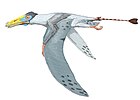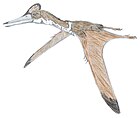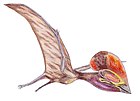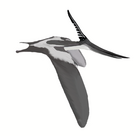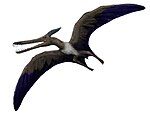Pangupterus
| Pangupterus Temporal range: Early Cretaceous,
| |
|---|---|
| Scientific classification | |
| Domain: | Eukaryota |
| Kingdom: | Animalia |
| Phylum: | Chordata |
| Order: | †Pterosauria |
| Suborder: | †Pterodactyloidea |
| Family: | †Ctenochasmatidae |
| Genus: | †Pangupterus Lü et al., 2016 |
| Species: | †P. liui
|
| Binomial name | |
| †Pangupterus liui Lü et al., 2016
| |
Pangupterus (meaning Pangu wing) is a genus of pterodactyloid pterosaur from the Early Cretaceous Jiufotang Formation of China. It was first described and named by Lü Junchang et al.[1]
It is known from a mostly-complete lower jaw, which bears 36 slender, evenly-spaced, conical teeth jutting out at an angle on its tip. Some teeth are smaller than the others, and appear to be replacement teeth. The teeth had a relatively high density of over 4 per centimetre (10/in), although the spaces between the teeth were wider than the diameter of the teeth themselves.[2] Such teeth are not seen in any other toothed pterosaurs from the Jiufotang Formation with comparable material, and this specialized dental morphology is indicative of a piscivorous lifestyle.[1]
Although no phylogenetic analysis was conducted to determine its affinities, Pangupterus has a small process, called an odontoid, on the end of the maxilla; such a process is also seen in the istiodactylids Longchengpterus and Istiodactylus.[1][3] In 2022, Chang-Fu Zhou and colleagues identified Pangupterus as a member of the Ctenochasmatidae without comment.[2]
References
[edit]- ^ a b c Lu, J.; Liu, C.; Pan, L.; Shen, C. (2016). "A New Pterodactyloid Pterosaur from the Early Cretaceous of the Western Part of Liaoning Province, Northeastern China". Acta Geologica Sinica. 90 (3): 777–782. doi:10.1111/1755-6724.12721. S2CID 132555691.
- ^ a b Zhou, C.-F.; Wang, X.; Wang, J. (2022). "First evidence for tooth–tooth occlusion in a ctenochasmatid pterosaur from the Early Cretaceous Jehol Biota". Geological Society, London, Special Publications. 521: 9–17. doi:10.1144/SP521-2021-141. S2CID 244695072.
- ^ Martill, D. (2014). "A functional odontoid in the dentary of the Early Cretaceous pterosaur Istiodactylus latidens: Implications for feeding". Cretaceous Research. 47: 56–65. doi:10.1016/j.cretres.2013.11.005.



